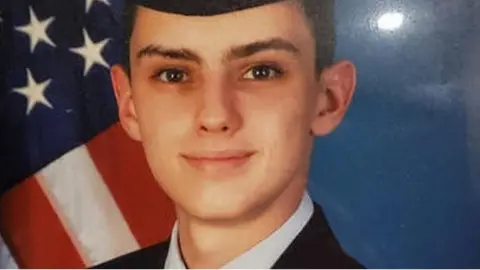Why did alleged Pentagon leaker Jack Teixeira have top secret access at age 21?
 Instagram
InstagramHow was a 21-year-old junior member of a reserve force allegedly able to access top secret US documents?
Access to classified intelligence is actually much more common than it might seem.
Jack Teixeira, who appeared in court on Friday, worked as a cyber transport systems journeyman with the US Air National Guard.
A description on the US Air Force website outlines the minimum requirements for his job.
These include a high school education and a "Single Scope Background Investigation".
Experts say this vetting procedure is fairly comprehensive.
It includes looking into a candidate's educational background, financial history and relationships, and will also include interviews with people who know them.
And having high-level access to information, even at 21, is not out of the ordinary.
"It is fairly commonplace for individuals of his age to have access to classified information," says Alexandria Seymour, an associate fellow at the Technology and National Security Program at the Center for a New American Security think tank.
Around half of active-duty enlisted members of the US military are aged 25 or younger, according to Department of Defence statistics.
While the exact details of Mr Teixeira's job are still emerging, Ms Seymour says it's possible that his work may have required access to a wide range of intelligence documents.
"Often people at his level are supporting senior leaders, and he might have a 'need to know' if he was prepping senior leaders or putting together briefing books," she says.
 Defense Intelligence Agency
Defense Intelligence AgencyChanges after 9/11 may have made leaks more likely
Dan Lomas, senior lecturer in intelligence and security studies at Brunel University, says thousands of people across the US military and intelligence establishment have a similar level of access.
"It's part of this drive to get as much information as possible for analysts to use," he says. "And that drive means that you are potentially opening up access to information that could be leaked."
That push began in the years after the September 11 attacks on New York and Washington, he says, when failure to share intelligence between US government agencies was one of the key shortcomings identified by government inquiries.
It's unclear exactly how Mr Teixeira was allegedly able to print off the classified documents and sneak them out of a military base, either electronically or on paper. But Mr Lomas notes that previous security breaches - such as leaks by Edward Snowden and Chelsea Manning - have demonstrated that security guidelines are not always rigorously followed.

More Pentagon leaks coverage:

Mark Zaid, a national security lawyer, told the BBC that Mr Teixeira's work would have given him access to the Joint Worldwide Intelligence Communications System, or JWICS, which he described as a "library of information" regarding US intelligence.
And there's a log of at least some of Mr Teixeira's work on classified systems, according to the criminal complaint, which notes that he searched for the word "leak" around the time the documents first got mainstream attention in news reports last week.
Gaps in the system exposed
US Defence Secretary Lloyd Austin announced a review of intelligence access on Thursday. During a press briefing, he said that "every US service member, Department of Defence civilian and contractor with access to classified information has a solemn legal and moral obligation to safeguard it and to report any suspicious activity or behaviour".
But Mr Lomas says the US intelligence community could be entering a "difficult period" and that new restrictions will limit information sharing between agencies.
"To have greater restrictions on information means more of a move towards a traditional type of strict need-to-know principles," he says.
Kurt Volker, former US ambassador to Nato, says US policymakers will still want intelligence to get to top officials.
"You do have to distribute it, but you have to do it in a smart way," he told the BBC. "You've got to be smarter than just making it available to everybody, permanently."
And ultimately, Ms Seymour says, the intelligence system relies on the people handling the data.
"It does raise questions about how we are training individuals on how to handle classified information," she says. "It's exposing gaps in the system that will be looked at … but there's also a level of trust that you place in these individuals, that they are there for the right reasons."
An affidavit provided by an FBI agent stated that Mr Teixeira would have "signed a lifetime binding non-disclosure agreement" to take on his role, and that he would have realised that releasing classified information could open him up to criminal charges - like the ones he now faces.
